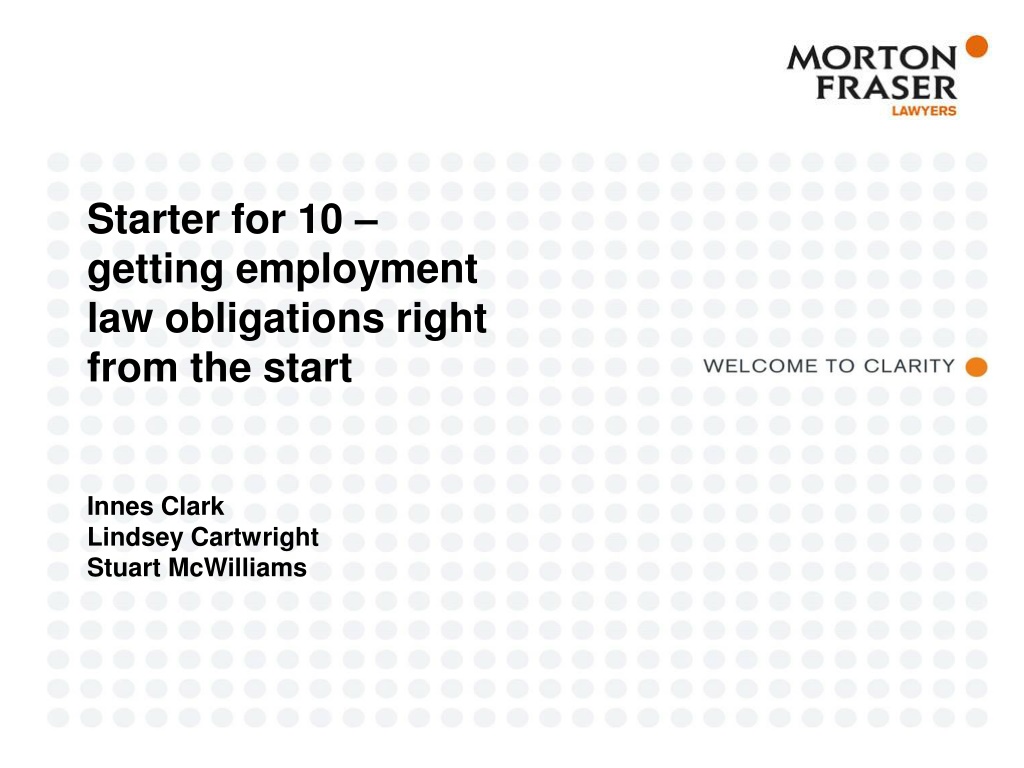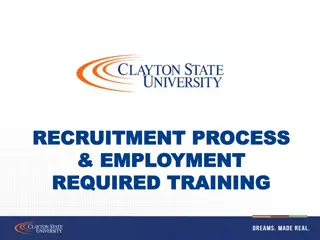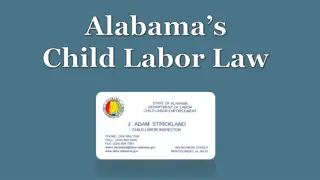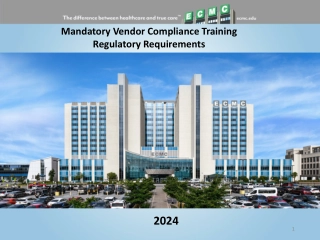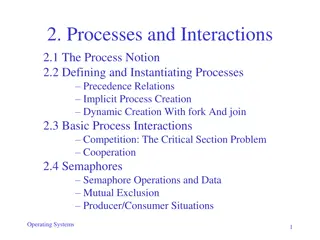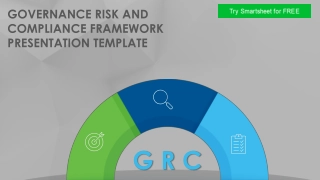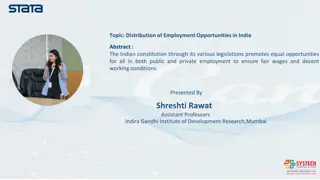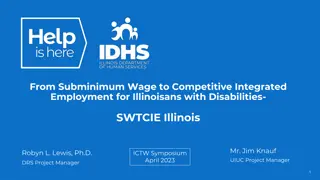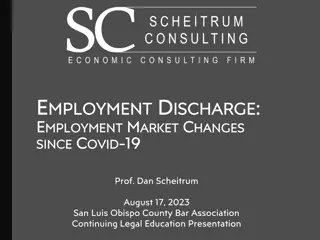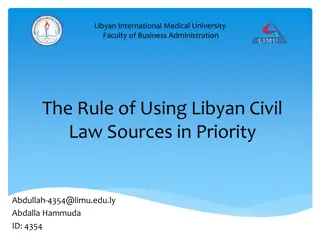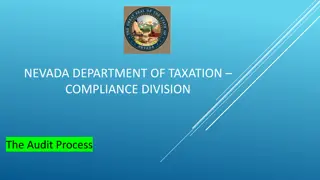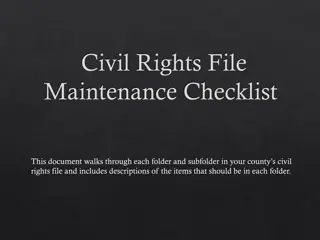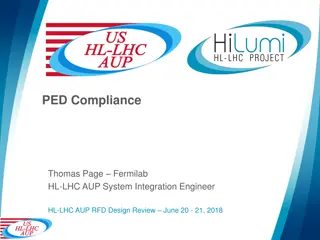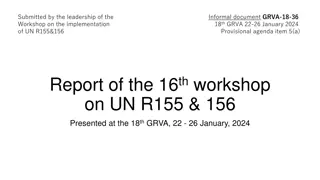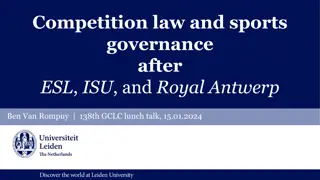Employment Law Obligations: Ensuring Compliance in Recruitment Processes
Ensuring compliance with employment law obligations from the start is crucial in recruiting. This includes avoiding discrimination, conducting right-to-work checks, handling early employee requests, making reasonable adjustments, ensuring compliance in contracts, effective probationary periods, and terminating employment correctly. Avoiding discrimination in recruitment is key, covering aspects like job adverts, application forms, interview processes, and ensuring a fair assessment of candidates. Audit your recruitment process to guarantee fairness and inclusivity.
Download Presentation
Please find below an Image/Link to download the presentation.
The content on the website is provided AS IS for your information and personal use only. It may not be sold, licensed, or shared on other websites without obtaining consent from the author. Download presentation by click this link. If you encounter any issues during the download, it is possible that the publisher has removed the file from their server.
- Employment Law
- Recruitment Compliance
- Discrimination Prevention
- Recruitment Process
- Legal Obligations
Presentation Transcript
Starter for 10 getting employment law obligations right from the start Innes Clark Lindsey Cartwright Stuart McWilliams
Overview Avoiding discriminating when recruiting Right to work checks Early requests by new employees Reasonable adjustments Flexible working Contracts of employment Are they compliant? Covering the end of the relationship at the beginning Effective probationary periods Terminating the employment relationship
Avoiding discrimination in recruitment Equality Act 2010 protects job applicants and prospective job applicants from discrimination Possible Employment Tribunal claims against employer and/or employees involved in the process
Avoiding discrimination in recruitment Content of job adverts Requirement that role is full time / requirement to be able to drive Format and content of application forms Requirement to disclose age Physical arrangements for interview Location and timing of interviews Requirement to attend evening only Format of interview Y v Bradford Council Q&A interview reasonable adjustment to provide written answers
Avoiding discrimination in recruitment Questions asked at interview Frost v David Harber Limited - age MacDonald v Consulate General of Japan in Edinburgh - childcare Questions about health or disability Content of assessment exercises Government Legal Services v Brookes Asperger s / multiple choice questions Comments made on the day Comments made when providing feedback
Avoiding discrimination in recruitment Audit your recruitment process to ensure:- Range of recruitment methods used to reach the widest possible pool Job adverts/application forms non-discriminatory Defined selection criteria in terms of measurable skills, experience, knowledge and personal qualities Candidates consistently assessed against selection criteria Non-discriminatory language No questions asked based on protected criteria Provide appropriate training to those involved in selection including unconscious bias training Records retained including job advert, application forms, interview notes, records of discussions, any written tests and training records, correspondence with candidates
Avoiding discrimination in recruitment Other issues Positive action AI can discriminate too! Guidance - EHRC Code Chapter 16 https://www.equalityhumanrights.com/en/publ ication-download/what-equality-law-means- you-employer-when-you-recruit-someone- work-you
Recruitment - right to work checks Penalties for hiring an illegal worker set to increase in 2024 ( 45,000 fine for a first offence!) Timing Too early and you risk discrimination claims After the first date of employment and you risk already committing an offence A National Insurance number is not proof of right to work
Recruitment - right to work checks Proper procedure provides protection against fines Manual checks for those who don t have Biometric cards or electronic status Using 3rdparties to carry out checks Electronic right to work checks Remote workers Follow up checks? What to do now?
Early requests for reasonable adjustments Disabled job applicants may make requests for adjustments to recruitment process Request for adjustment to role could be made any time from acceptance of offer onward Not unlawful to make job offer conditional on passing an OH check BUT offer can only be subsequently withdrawn if individual does not meet required condition and there are no reasonable adjustments that can be made to support them in their role Great Big Workplace Adjustments Survey 2023 found disabled workers are waiting too long for adjustments and over half continued to face disability related barriers even after adjustments made
Early enquiry about flexible working Right to request flexible working still requires 26 weeks service Anticipated change to the law to implement right to request flexible working as a day 1 right is NOT part of the final approved legislation BUT do not ignore early requests as risk of discrimination claims if not properly considered
Early enquiry about flexible working Once new Act in force:- Will be able to make 2 flexible working requests per annum Requests to be dealt with within 2 months if no extension agreed (reduction from 3 months) Can t refuse request without consultation No longer any need for the person making it to explain, in the request, the effect of agreeing to the change and how it might be dealt with
Contracts of employment - minimum requirements Section 1 statements: Minimum requirement Not necessarily contractual Provided to employees and workers not later than the beginning of employment Terms of contract will override terms of section 1 statement if both exist Some employers make an offer of employment, then issue section 1 statement later check they are consistent
Contracts of employment covering off the end of the relationship Notice Statutory minimum must be met Contractual notice period Should be clear and unambiguous Contract may set out mechanics of giving notice Follow your own mechanics! Pay in lieu of notice clause Safeguards restrictive covenants on termination Recent case law suggests that use of PILON after a resignation may change the nature of the termination to a dismissal
Contracts of employment covering off the end of the relationship Garden leave Express term overrides implied right to work Applies during a notice period garden leave isn t another expression for paid leave Can require alternative duties, only some of usual contractual duties or none at all Can be used to keep the employee out of the market long enough for valuable information to go out of date Gives time for successor to establish themselves with customers, protecting goodwill Employer must continue to perform terms of contract including payment of salary, provision of contractual benefits, allowing holidays etc Check any terms that apply re using up holidays
Contracts of employment covering off the end of the relationship Post-termination restrictive covenants Specifically designed to reflect parties circumstances Limit employee conduct to protect employers business from damage May deter employees from joining competitor Must protect legitimate proprietary interest for which the restraint is reasonably necessary Protection must be no more than is reasonable having regard to interests of parties and public interest
Contracts of employment covering off the end of the relationship What can be protected? Trade connections with customers, clients or suppliers Goodwill Trade secrets and other confidential information Stability of workforce
Contracts of employment covering off the end of the relationship Types of restrictive covenant Non-solicitation Non-dealing Non-poaching and non-employment Non-competition Remember to update when required e.g. on promotion or transfer to a different role
Future reform Confidentiality clauses UK Government intends to legislate to require any limitations of a confidentiality clause in an employment contract to be added as one of the mandatory section 1 employment particulars No current timeframe for implementation Non-compete restrictions UK Government intend to legislate to limit the length of non-compete clauses to 3 months Not intended to interfere with use of notice periods/gardening leave/non-solicitation clauses
Effective use of probationary periods No special statutory legal status Must be in the section 1 statement, including any applicable terms during probationary period Provides suitable amount of time in which to assess employee Customary to specify a shorter notice period during probationary period Can extend probationary period if unhappy do it before expiry
Effective use of probationary periods Structure the probationary period to ensure:- Employee is aware from outset of any specific goals or attainments expected during the period Information on performance can be gathered and considered and addressed in good time Clear feedback is given to the employee on progress and performance Records are kept of feedback Decisions on any extension or steps required of the employee are confirmed in writing A decision is taken shortly prior to the end of the probationary period on whether to confirm employment/extend probation/terminate employment
Handling early terminations Insufficiency of service to claim ordinary unfair dismissal or constructive dismissal Risks Automatically unfair dismissal Discrimination Breach of contract Commercial risks loss of proprietary information Often advisable to follow some degree of procedure Ensures paper trail setting out motivation for termination
